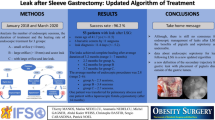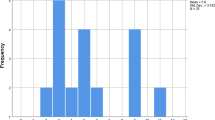Abstract
Introduction
Laparoscopic sleeve gastrectomy (LSG) is the most performed bariatric procedure worldwide. The most challenging postoperative complication is gastric leak. The objectives of this study are to examine the efficacy and morbidity of different therapeutic strategies addressing leakage, and the long-term outcomes of a cohort of LSG leaks.
Methods
A retrospective review of patients treated for LSG leaks between September 2014 and January 2023 at our high-volume bariatric surgery center was performed.
Results
The charts of 37 patients (29 women and 8 men) were reviewed, with a mean age of 43 years and a median follow-up of 24 months. The mean preoperative body mass index was 45.1 kg/m2. Overall, 30/37 (81%) patients were successfully treated with endoscopic management, and 7/37 (19%) ultimately underwent salvage surgery. If the leak was diagnosed earlier than 6 weeks, endoscopic treatment had a 97% success rate. The median number of endoscopic procedures was 2 per patient, and included internal pigtails, stents, septoplasty, endoluminal vacuum therapy and over-the-scope clips. Complications included stent-related ulcers (10), esophageal stenosis requiring endoscopic dilatations (4), stent migrations (2) and kinking requiring repositioning (1), and internal pigtail migration (3). Revisional surgery consisted of proximal gastrectomy and Roux-en-Y esophago-jejunal anastomosis, Roux-en-Y fistulo-jejunostomy or classic Roux-en-Y gastric bypass proximal to the gastric stricture. In 62% of the cases, the axis/caliber of the LSG was abnormal. Beyond 4 attempts, endoscopy was unsuccessful. The success rate of endoscopic management dropped to 25% when treatment was initiated more than 45 days after the index surgery.
Conclusions
Purely endoscopic management was successful in 81% of cases; with 97% success rate if diagnosis earlier than 6 weeks. After four failed endoscopic procedures, a surgical approach should be considered. Delayed diagnosis appears to be a significant risk factor for failure of endoscopic treatment.

Similar content being viewed by others
References
McKenna D, Selzer D, Burchett M, Choi J, Mattar SG (2014) Revisional bariatric surgery is more effective for improving obesity-related co-morbidities than it is for reinducing major weight loss. Surg Obes Relat Dis Off J Am Soc Bariatr Surg 10(4):654–659
Yan J, Cohen R, Aminian A (2017) Reoperative bariatric surgery for treatment of type 2 diabetes mellitus. Surg Obes Relat Dis Off J Am Soc Bariatr Surg 13(8):1412–1421
Aleassa EM, Hassan M, Hayes K, Brethauer SA, Schauer PR, Aminian A (2019) Effect of revisional bariatric surgery on type 2 diabetes mellitus. Surg Endosc 33(8):2642–2648
Sjöström L, Gummesson A, Sjöström CD, Narbro K, Peltonen M, Wedel H et al (2009) Effects of bariatric surgery on cancer incidence in obese patients in Sweden (Swedish Obese Subjects Study): a prospective, controlled intervention trial. Lancet Oncol 10(7):653–662
Anveden Å, Taube M, Peltonen M, Jacobson P, Andersson-Assarsson JC, Sjöholm K et al (2017) Long-term incidence of female-specific cancer after bariatric surgery or usual care in the Swedish Obese Subjects Study. Gynecol Oncol 145(2):224–229
Schauer DP, Feigelson HS, Koebnick C, Caan B, Weinmann S, Leonard AC et al (2019) Bariatric surgery and the risk of cancer in a large multisite cohort. Ann Surg 269(1):95–101
Tao W, Santoni G, von Euler-Chelpin M, Ljung R, Lynge E, Pukkala E et al (2020) Cancer risk after bariatric surgery in a cohort study from the five Nordic countries. Obes Surg 30(10):3761–3767
Aminian A, Wilson R, Al-Kurd A, Tu C, Milinovich A, Kroh M et al (2022) Association of bariatric surgery with cancer risk and mortality in adults with obesity. JAMA 327(24):2423–2433
Adams TD, Gress RE, Smith SC, Halverson RC, Simper SC, Rosamond WD et al (2007) Long-term mortality after gastric bypass surgery. N Engl J Med 357(8):753–761
Syn NL, Cummings DE, Wang LZ, Lin DJ, Zhao JJ, Loh M et al (2021) Association of metabolic-bariatric surgery with long-term survival in adults with and without diabetes: a one-stage meta-analysis of matched cohort and prospective controlled studies with 174 772 participants. Lancet Lond Engl 397(10287):1830–1841
Regan JP, Inabnet WB, Gagner M, Pomp A (2003) Early experience with two-stage laparoscopic Roux-en-Y gastric bypass as an alternative in the super-super obese patient. Obes Surg 13(6):861–864
Clapp B, Ponce J, DeMaria E, Ghanem O, Hutter M, Kothari S et al (2022) American Society for Metabolic and Bariatric Surgery 2020 estimate of metabolic and bariatric procedures performed in the United States. Surg Obes Relat Dis 18:1134–1140
Aurora AR, Khaitan L, Saber AA (2012) Sleeve gastrectomy and the risk of leak: a systematic analysis of 4,888 patients. Surg Endosc 26(6):1509–1515
Rosenthal RJ (2012) International sleeve gastrectomy expert panel consensus statement: best practice guidelines based on experience of >12,000 cases. Surg Obes Relat Dis 8(1):8–19
Rodrigues-Pinto E, Repici A, Donatelli G, Macedo G, Devière J, van Hooft JE et al (2019) International multicenter expert survey on endoscopic treatment of upper gastrointestinal anastomotic leaks. Endosc Int Open 7(12):E1671–E1682
Raju GS, Thompson C, Zwischenberger JB (2005) Emerging endoscopic options in the management of esophageal leaks (videos). Gastrointest Endosc 62(2):278–286
Gelbmann CM, Ratiu NL, Rath HC, Rogler G, Lock G, Schölmerich J et al (2004) Use of self-expandable plastic stents for the treatment of esophageal perforations and symptomatic anastomotic leaks. Endoscopy 36(8):695–699
Langer FB, Wenzl E, Prager G, Salat A, Miholic J, Mang T et al (2005) Management of postoperative esophageal leaks with the Polyflex self-expanding covered plastic stent. Ann Thorac Surg 79(2):398–403 (discussion 404)
Basha J, Appasani S, Sinha SK, Siddappa P, Dhaliwal HS, Verma GR et al (2014) Mega stents: a new option for management of leaks following laparoscopic sleeve gastrectomy. Endoscopy 46(Suppl 1):E49–E50
Galloro G, Magno L, Musella M, Manta R, Zullo A, Forestieri P (2014) A novel dedicated endoscopic stent for staple-line leaks after laparoscopic sleeve gastrectomy: a case series. Surg Obes Relat Dis Off J Am Soc Bariatr Surg 10(4):607–611
Garofalo F, Noreau-Nguyen M, Denis R, Atlas H, Garneau P, Pescarus R (2017) Evolution of endoscopic treatment of sleeve gastrectomy leaks: from partially covered to long, fully covered stents. Surg Obes Relat Dis Off J Am Soc Bariatr Surg 13(6):925–932
Shehab H, Abdallah E, Gawdat K, Elattar I (2018) Large bariatric-specific stents and over-the-scope clips in the management of post-bariatric surgery leaks. Obes Surg 28(1):15–24
Donatelli G, Ferretti S, Vergeau BM, Dhumane P, Dumont JL, Derhy S et al (2014) Endoscopic internal drainage with enteral nutrition (EDEN) for treatment of leaks following sleeve gastrectomy. Obes Surg 24(8):1400–1407
Loske G, Schorsch T, Müller C (2011) Intraluminal and intracavitary vacuum therapy for esophageal leakage: a new endoscopic minimally invasive approach. Endoscopy 43(6):540–544
Campos JM, Ferreira FC, Teixeira AF, Lima JS, Moon RC, D’Assunção MA et al (2016) Septotomy and balloon dilation to treat chronic leak after sleeve gastrectomy: technical principles. Obes Surg 26(8):1992–1993
Rodrigues-Pinto E, Pereira P, Sousa-Pinto B, Shehab H, Pinho R, Larsen MC et al (2021) Retrospective multicenter study on endoscopic treatment of upper GI postsurgical leaks. Gastrointest Endosc 93(6):1283-1299.e2
Johari Y, Catchlove W, Tse M, Shaw K, Paul E, Chen R et al (2022) A 4-tier protocolized radiological classification system for leaks following sleeve gastrectomy. Ann Surg 275(2):e401
Park JY (2022) Diagnosis and management of postoperative complications after sleeve gastrectomy. J Metab Bariatr Surg 11(1):1–12
Lainas P, Triantafyllou E, Ben Amor V, Savvala N, Gugenheim J, Dagher I et al (2022) Laparoscopic Roux-en-Y fistulojejunostomy as a salvage procedure in patients with chronic gastric leak after sleeve gastrectomy. Surg Obes Relat Dis Off J Am Soc Bariatr Surg S1550–7289(22):00806–00811
Rogalski P, Swidnicka-Siergiejko A, Wasielica-Berger J, Zienkiewicz D, Wieckowska B, Wroblewski E et al (2021) Endoscopic management of leaks and fistulas after bariatric surgery: a systematic review and meta-analysis. Surg Endosc 35(3):1067–1087
Manos T, Nedelcu M, Nedelcu A, Gagner M, Weiss AK, Bastid C et al (2021) Leak after sleeve gastrectomy: updated algorithm of treatment. Obes Surg 31(11):4861–4867
Christophorou D, Valats JC, Funakoshi N, Duflos C, Picot MC, Vedrenne B et al (2015) Endoscopic treatment of fistula after sleeve gastrectomy: results of a multicenter retrospective study. Endoscopy 47(11):988–996
Abou Rached A, Basile M, El Masri H (2014) Gastric leaks post sleeve gastrectomy: review of its prevention and management. World J Gastroenterol WJG 20(38):13904–13910
Sharples AJ, Mahawar K (2020) Systematic review and meta-analysis of randomised controlled trials comparing long-term outcomes of Roux-En-Y gastric bypass and sleeve gastrectomy. Obes Surg 30(2):664–672
Author information
Authors and Affiliations
Corresponding author
Ethics declarations
Disclosures
Alexis Deffain, Heba Alfaris, Roy Hajjar, Felix Thibeault, Wael Dimassi, Ronald Denis, Pierre Y. Garneau, Anne-Sophie Studer and Radu Pescarus have no conflicts of interest or financial ties to disclose.
Additional information
Publisher's Note
Springer Nature remains neutral with regard to jurisdictional claims in published maps and institutional affiliations.
Rights and permissions
Springer Nature or its licensor (e.g. a society or other partner) holds exclusive rights to this article under a publishing agreement with the author(s) or other rightsholder(s); author self-archiving of the accepted manuscript version of this article is solely governed by the terms of such publishing agreement and applicable law.
About this article
Cite this article
Deffain, A., Alfaris, H., Hajjar, R. et al. Long-term follow-up of a cohort with post sleeve gastrectomy leaks: results of endoscopic treatment and salvage surgery. Surg Endosc 37, 9358–9365 (2023). https://doi.org/10.1007/s00464-023-10386-2
Received:
Accepted:
Published:
Issue Date:
DOI: https://doi.org/10.1007/s00464-023-10386-2




